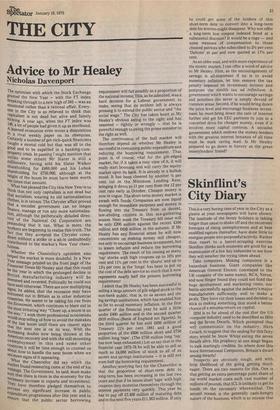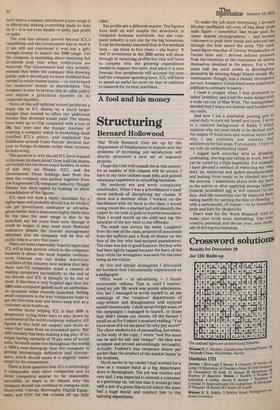Skinflint's City Diary
This is a very boring time of year in the City as a glance at your newspapers will have shown. The lassitude of the boozy holidays is taking longer than usual to shake off and the recurrent forecasts of rising unemployment and at best modified rapture thereafter, have done little to energise people into purposeful activity. Rather than resort to a barrel-scraping exercise Skinflint thinks such moments are good for an examination of a few key industries to see how they will weather the trying times ahead.
Take computers. Making computers is a hazardous business. Giant companies like American General Electric (unrelated to the UK company of the same name), RCA, Xerox, and now Singer found they could not fund the huge development and marketing costs, nor battle successfully against the industry's major 'manufacturers sufficiently well to make a profit. They have cut their losses and decided to stick to making something that stood a better chance of a sensible return on capital.
IBM is so far ahead of the rest that the US computer industry used to be described as IBM and the Seven Dwarfs. Which prompted that wry commentator on the industry, Herb Grosch, to suggest that the ending for this fairy story would be Snow White eating the seven dwarfs alive. His prophecy at one stage began to look startingly credible. So where does this leave International Computers, Britain's dwarf among dwarfs?
Prospects are obviously tough, and with little likelihood of the going getting much easier. There are two reasons for this. One is that getting an extra percentage point share of the world market costs such vast number of millions of pounds, that ICL is unlikely to get its hands on the necessary wherewithal. The second reason is the generally cash-hungry nature of the business, which is so intense that each time a company introduces a new range it is effectively staking everything made to date on it — it is not even double or quits, just profit or quits.
The cost has already proved beyond ICL's capabilities and the Government had to lend it (I am still not convinced it was not a gift) enough money to launch the 2900 range. Yet the company is muttering about restoring full dividends next year when restrictions are removed. The Government had very sensibly insisted that while the company was drawing public cash it should pay no more dividend than needed to retain trustee status — i.e. not to hand out taxpayers' money to shareholders. The company is now to reverse this selisible policy and impose a gratuitous squeeze on its corporate liquidity.
News of this self-inflicted wound produced a sharp rise in ICL shares, by a much larger margin than needed to offset the additional income that dividend would yield. The shares have been up to 115p compared with a low of 29p last year and the myopic reaction of wanting a company which is weakening itself justified ICL's policy, and explained the hullabaloo around Coats Patons' decision last year to forego dividends rather than increase its borrowing.
The question is, why should ICL have wanted to increase its share price? Over half the shares are locked into the three major holders; in order of size they are Plessey, GEC, and the Government. These holdings date from the time the company was pushed together from the fragmented UK computer industry, though Plessey has since upped its holding to allow consolidation of the figures.
ICL does not look a likely candidate for a rights issue and probably should not be while it can get government assistance at advantageous terms. And it does seem highly likely that by the time the next range is due to be launched, say ten years from now, though it could be longer, it may need more financial assistance despite the current management optimism that the company will be free of public help in a very few years.
There are some reasonably hopeful signs that ICL will at least survive, which in the computer business is about the most hopeful mediumterm forecast one can make. American watchers of the industry now reckon that only three non-US companies stand a chance of making computers successfully to the end of the decade and ICL is thought to be one of them. It has been a very hopeful sign that the 2903 mini-computer gained such an enthusiastic reception when recently launched. Selling small computers is the way companies hope to get the first time user and hence keep him as a customer as he trades up.
Another factor helping ICL is that IBM is desperately trying these days to play down its dominance of the world computer industry. All figures in this field are suspect and more so when they come from an interested party, but IBM certainly has been making a big play of no longer having upwards of 70 per cent of world sales. So much under fire throughout the world is IBM's near-monopoly that the company is getting increasingly defensive and circumspect, which should make it a slightly easier target for its competitors.
There is little question that ICL's technology is comparable with other companies and its latest computers appear to be reasonably successful, so there is no reason why the company should not continue to compete with Honeywell, Univac, Burroughs, Digital Equipment, and CDC for the crumbs off the IBM table.
But profits are a different matter. The figures have held up well despite the slowdown in computer business worldwide, but the computer industry is not one for the big bonanzas. It can be resonably assumed that in the medium term — say three to five years — the heavy R and D investment in the 2900 series will show through in mounting profits but this will have to compete With the growing expenditure needed to support the sales. And since it is now forecast that peripherals will account for overhalf the computer spending soon, ICL will have to spend an awful lot more on that in addition to research for its next machines.



























 Previous page
Previous page